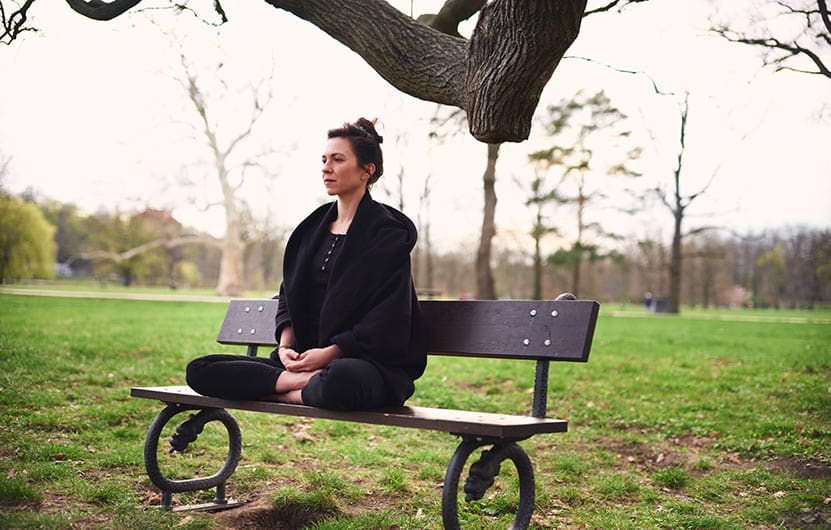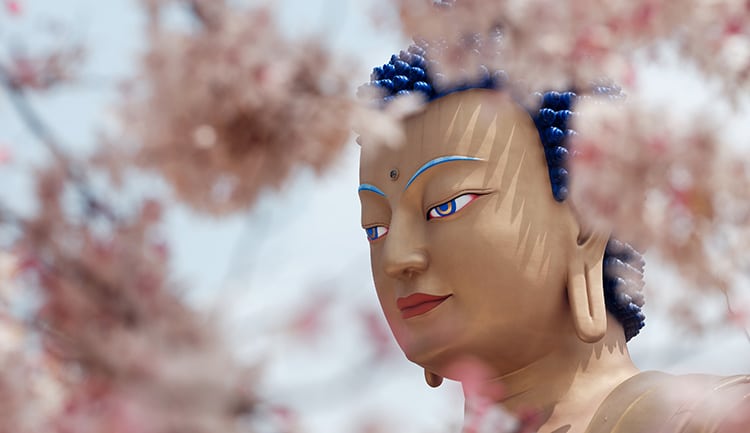Can Meditation Help With Anxiety?
Category: Benefits of Meditation | Health and Meditation | Popular | Seniors Meditation | Stress and Anxiety

If you constantly feel nervous, worried or uneasy due to past or future events, you may be suffering from anxiety. Everyone gets anxious at some point or another. Generally speaking, being anxious is not a malady – it’s a normal apprehension that’s connected to concerns about the future. But when worry dominates our actions and mental state, that’s anxiety. Some people’s anxiety is unpredictable and overwhelming; it may take the form of panic attacks or other “tidal wave” reactions. Because it takes up so much of our mental space, anxiety can have a negative impact on our career, relationships and social life. Luckily, meditation for anxiety can help sufferers deal with this difficult condition.
What does the science say?
In the years since Dr. Jon Kabat-Zinn developed the Mindfulness-Based Stress Reduction program at the University of Massachusetts Medical Center in the 1970s, tens of thousands of people have completed the 8-week MBSR workshop. Research suggests that in addition to effectively reducing stress, MBSR offers many other mental and physical health benefits as well, including the ability to better manage chronic pain, depression and anxiety. The evidence is mounting that meditation can help fight depression.
The authors of a study entitled “The Effect of Mindfulness-Based Therapy on Anxiety and Depression: A Meta-Analytic Review” looked at 39 studies involving over a thousand participants who suffered from a range of clinical conditions, including anxiety. Based on their findings, they concluded that mindfulness-based therapy was an effective and “promising intervention for treating anxiety and mood problems in clinical populations.” They wrote that “The basic premise underlying mindfulness practices is that experiencing the present moment nonjudgmentally and openly can effectively counter the effects of stressors, because excessive orientation toward the past or future when dealing with stressors can be related to feelings of depression and anxiety.”
Meditation Techniques for Anxiety
What this means is that mindfulness can help you become more aware of your current physical and mental states. Instead of being overwhelmed by them, you are able to identify the emotions and sensations, benevolently acknowledge them and let them go, like autumn leaves floating by on a gentle stream. This ability to recognize and disengage from unwholesome mental states is a powerful antidote to anxiety and many other conditions. By practicing mindfulness regularly, you create space between yourself and your stressors, making it easier to stay calm in challenging situations. You might also explore resources like self-paced anxiety courses to deepen your understanding and refine your approach to managing stress effectively.
How does it work?
Anxiety disorders are more than the normal anxiety we may experience when we need to make a speech, take an exam, interview for a job or set off for parts unknown. For those who have an anxiety disorder, the anxious feelings don’t go away – they may even get worse with time, or interfere with sleep.
For everyday anxiety, meditation is a great help; for a chronic disorder, some form of therapy – a mindfulness-based therapy, for example – is recommended. Taking some quiet time to breathe deeply and oxygenate the system can help bring about the relaxation response. The American Institute of Stress recommends abdominal breathing, with 20 to 30 minutes a day giving most benefit. “Deep breathing increases the supply of oxygen to your brain and stimulates the parasympathetic nervous system, which promotes a state of calmness. Breathing techniques help you feel connected to your body—it brings your awareness away from the worries in your head and quiets your mind.”
Rather than getting worried about future events and allowing anxious feelings to overwhelm you, you can turn to meditation. Meditation naturally calms the nerves and helps you appreciate the here and now. And you don’t need a special “meditation kit” to sit. A few quiet, mindful minutes in a corner of your home, at the office, library, school or park can make all the difference. The beauty of meditation is that it’s totally accessible.
During mindfulness meditation, you settle your attention on your breath, a visual object or physical sensations. With breath, for example, the experience of inhaling and exhaling becomes the focus of your meditation. Your mind will wander. This is perfectly normal. When you notice it, try simply to redirect your focus back to your breathing. Note that you are not experimenting with or analyzing the breath – you are simply observing it with your full attention.
With time you’ll notice that when your mind is calmly settled on the breath – even if it’s only for a minute or two – you will experience calmness even though anxious thoughts might be popping up like popcorn. This is because once you’ve learned to acknowledge these anxious thoughts, you can gently but firmly let go of them and return to the breath.
Meditation for Compassion
According to Trungram Gyalwa, PhD a world-renowned meditation master, meditation helps us cultivate an essential human quality: compassion. Compassion allows us to overcome fear by helping us accept ourselves, others, and life situations just as they are. This nonjudgmental acceptance is a great relief for people with anxiety. The ultimate goal of meditating isn’t to live a problem-free life, but to learn how the mind works and how to work with the mind. This deep insight naturally leads to compassion.
It is best to make sitting meditation part of your daily routine. Even 5 minutes a day, with consistency, makes a huge difference. Researchers have linked meditation not only to deep physical relaxation and peacefulness, but also to increased empathy and a more balanced sense of self. By improving cognitive flexibility and leading to insights into the workings of the mind, meditation is an unparalleled natural remedy for anxiety.






